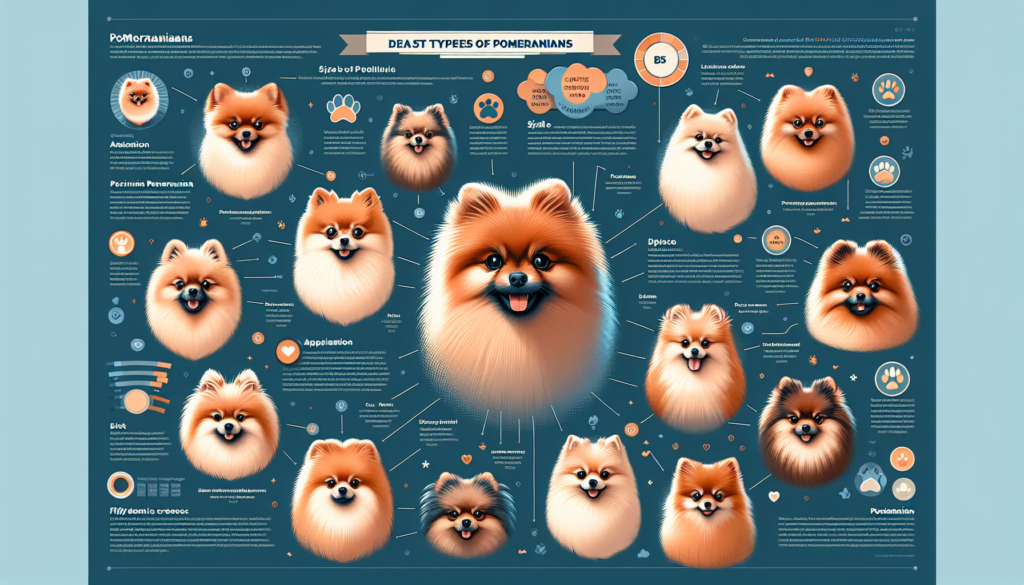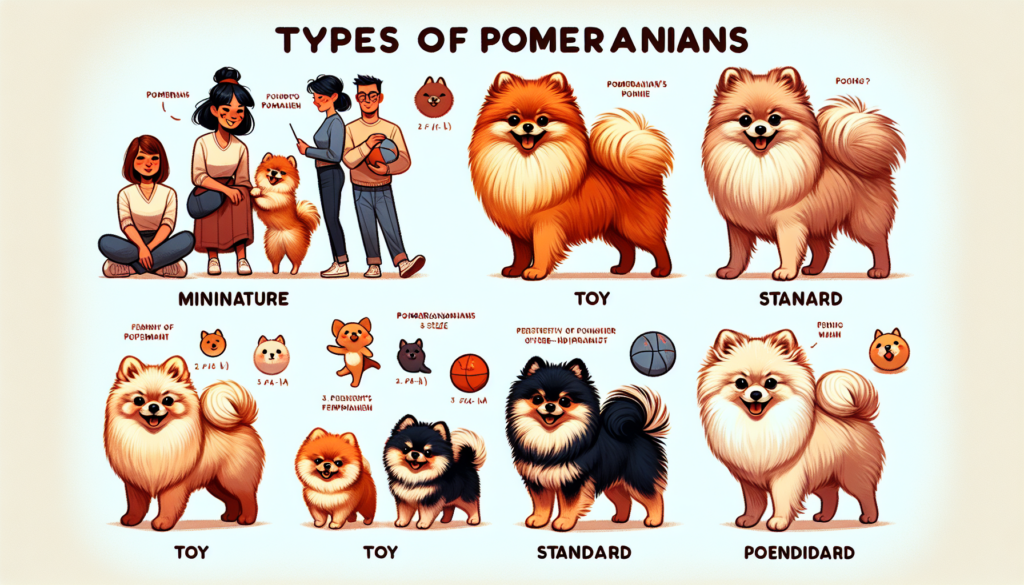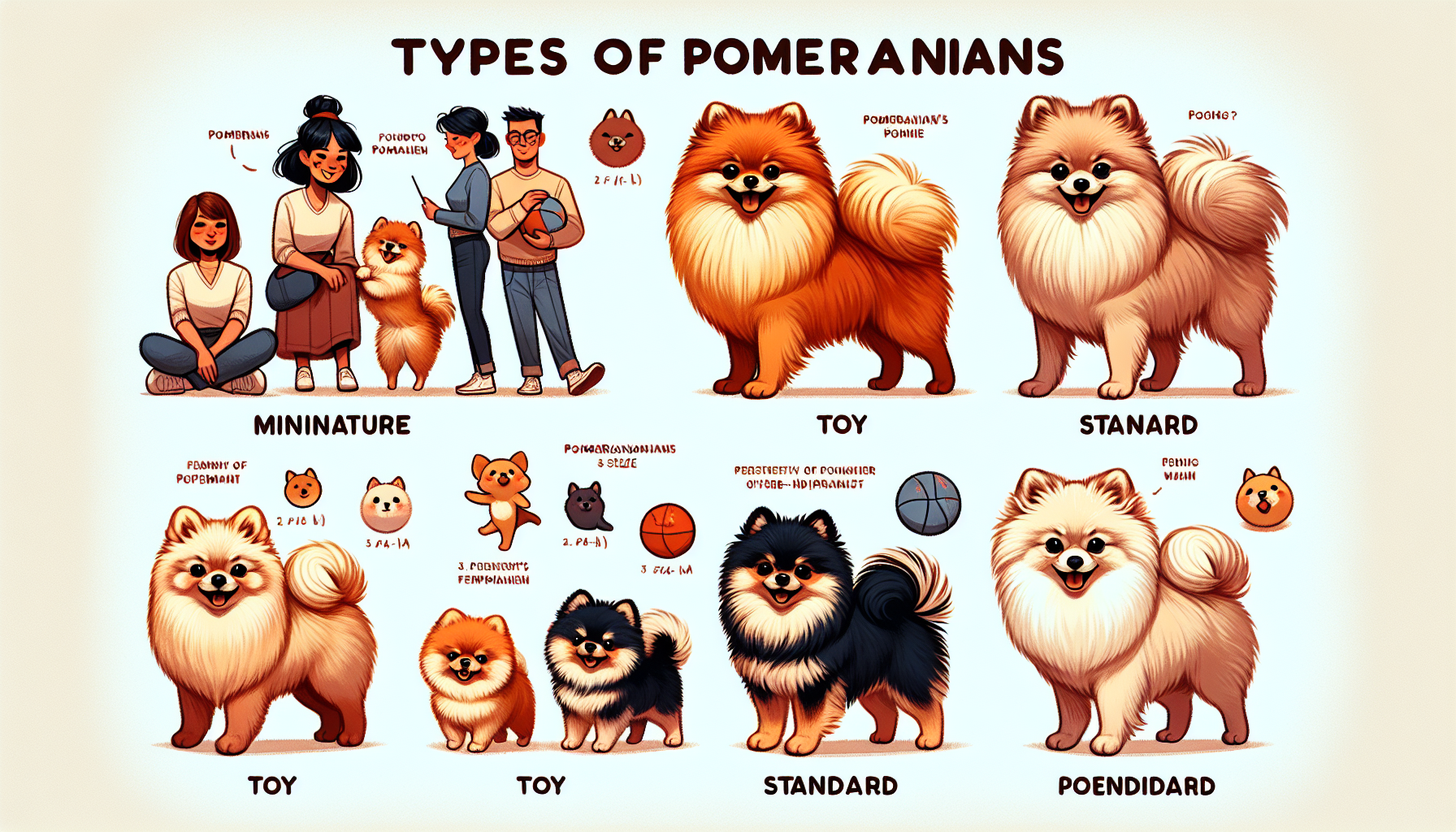If you find Pomeranians adorable and are considering adding one to your family, it’s important to understand that there are actually different types of this breed. While all Pomeranians share common traits like their small size and vibrant personalities, they also come in various sizes, coat colors, and patterns. From the tiny and compact teddy bear Pomeranians to the slightly larger and more fox-like type, this article will help you gain a better understanding of the different types of Pomeranians so you can find the perfect furry friend for you.
Size Variations
Standard Pomeranian
The Standard Pomeranian is the largest of the Pomeranian breed, weighing between 4-7 pounds and standing about 8-11 inches tall at the shoulder. Despite being labeled as “standard,” they are still small dogs. Standard Pomeranians have a sturdy build and are known for their fluffy, double coat and plumed tail. They are charming and friendly companions, making them a popular choice among dog lovers.
Miniature Pomeranian
Miniature Pomeranians, also known as Mini Poms or Pom Minis, are the mid-size variation of the Pomeranian breed. They typically weigh between 3-5 pounds and stand around 6-7 inches tall. Miniature Pomeranians have a compact body and retain the same coat and tail characteristics as their larger counterparts. Their small size makes them suitable for individuals or families living in smaller spaces.
Toy Pomeranian
The Toy Pomeranian, also referred to as a Teacup Pomeranian, is the smallest size variation of the Pomeranian breed. These tiny dogs usually weigh under 3 pounds and stand less than 6 inches in height. Toy Pomeranians have all the signature features of the breed, including the glorious coat and plumed tail, but in a pocket-sized package. Despite their small stature, they are full of energy and make delightful companions for those looking for a portable pet.
Coat Variations
Full-Coat Pomeranian
The Full-Coat Pomeranian is the most recognizable coat variation of the breed. They have a thick, fluffy double coat that extends over their entire body, giving them a luxurious appearance. The coat requires regular brushing and occasional professional grooming to prevent matting and maintain its natural luster. Full-Coat Pomeranians are available in a variety of colors and patterns, making each dog unique and beautiful in its own way.
Sable Pomeranian
The Sable Pomeranian is characterized by its coat that showcases a mixture of black, brown, and/or gray guard hairs with a light-colored undercoat. The combination creates a stunning effect, resembling a wolf-like appearance. Sable Pomeranians are known for their gorgeous coloration and are highly sought after by dog enthusiasts. Regular grooming and brushing are essential to keep their coats healthy and free of tangles.
Merle Pomeranian
The Merle Pomeranian displays a unique coat pattern characterized by patches of lighter or darker pigmentation dispersed throughout the base coat. This pattern can be seen in a variety of colors, creating a striking and eye-catching look. Merle Pomeranians are cherished for their one-of-a-kind coats, but it’s important to note that breeding for this pattern can sometimes result in health issues. Regular grooming and care are necessary to ensure their coats remain in optimal condition.
Parti Pomeranian
Parti Pomeranians possess a distinct coat pattern consisting of two or more different colors. The base color is usually white, while the secondary colors can vary widely. These multi-colored Pomeranians are known for their captivating appearance and are often a result of selective breeding. Maintaining their coat requires regular brushing and grooming to keep it looking vibrant and free from tangles.
Beaver Pomeranian
Beaver Pomeranians are identified by their unique brown coat coloration, resembling the color of a beaver’s fur. The richness of their coat, combined with their playful and affectionate nature, makes them beloved companions. Regular grooming and brushing are necessary to keep their fur looking shiny and healthy.
Fox-Faced Pomeranian
The Fox-Faced Pomeranian, as the name suggests, has a distinct facial structure resembling that of a fox. They have a narrow muzzle and almond-shaped eyes, giving them an alert and intelligent expression. This distinctive feature sets them apart from other Pomeranian variations. Fox-Faced Pomeranians require regular grooming to maintain their fluffy coat and distinctive appearance.
Teddy Bear Pomeranian
Teddy Bear Pomeranians are bred to have a fluffy and rounded face, resembling that of a teddy bear. They have a compact body and a thick, soft coat that makes them irresistibly cuddly. Teddy Bear Pomeranians have become increasingly popular due to their adorable appearance, but it’s important to note that breeding for this specific look may increase the risk of health issues. Regular grooming and brushing are essential to keep their coat fluffy and free from mats.
Cutie Pomeranian
The Cutie Pomeranian is an endearing term used to describe any Pomeranian with an adorable appearance. Their looks can vary, but they all possess the charm and lovable qualities that make them popular companions. Each Cutie Pomeranian is unique and may exhibit traits from different coat variations, making them truly special and delightful to be around.

Color Variations
Orange Pomeranian
Orange Pomeranians are known for their vibrant coat color, which could range from a deep reddish-orange to a lighter, almost golden shade. Their beautiful coats, combined with their lively personalities, make them a popular choice among Pomeranian enthusiasts. Regular grooming and maintenance are crucial to keeping their coats healthy and lustrous.
Black Pomeranian
Black Pomeranians boast a solid black coat that can range from jet black to a slightly faded hue. Their all-black appearance gives them a sleek and elegant look. While black Pomeranians are stunning to look at, their coats require regular grooming to keep them looking their best and to prevent matting.
White Pomeranian
White Pomeranians have a pure white coat that exudes a sense of beauty and elegance. Their pristine appearance often captivates dog enthusiasts. Maintaining a white Pomeranian’s coat requires regular grooming to prevent staining and discoloration. Additionally, they may be more prone to sunburn, so extra care should be taken to protect them from excessive sun exposure.
Cream Pomeranian
Cream Pomeranians possess a soft, creamy-colored coat that radiates warmth and charm. They fall within the lighter color spectrum, yet their coats can still vary in shade. Cream Pomeranians require regular grooming to keep their coats looking fluffy and free from tangles.
Blue Pomeranian
Blue Pomeranians have a coat with a bluish-gray hue, which creates a striking and unique appearance that sets them apart from other color variations. Their coats require regular grooming and attention to maintain their natural luster and prevent matting.
Chocolate Pomeranian
Chocolate Pomeranians have a rich, dark brown coat, reminiscent of everyone’s favorite sweet treat. Their stunning coloration, combined with their bubbly personalities, makes them incredibly endearing. Regular grooming and brushing are essential to keep their coats shiny and healthy.
Lavender Pomeranian
Lavender Pomeranians, also known as lilac Pomeranians, boast a coat color that resembles shades of pale purple or silver. Their ethereal appearance makes them stand out in a crowd. Lavender Pomeranians require regular grooming and care to maintain the beauty and health of their unique coat.
Merle Pomeranian
Merle Pomeranians exhibit a coat pattern featuring patches of lighter or darker colors dispersed throughout their base coat. This pattern can be seen in a variety of colors, including combinations of blues, grays, and browns, creating a stunning and eye-catching look. Regular grooming and care are necessary to preserve the vibrant and striking appearance of their coats.
Personality and Temperament
Social and Affectionate
Pomeranians are renowned for their social and affectionate nature. They thrive on companionship and love being the center of attention. Pomeranians have a deep bond with their owners and enjoy spending time with family members. Their affectionate personality makes them great companions for individuals or families seeking a loyal and loving pet.
Intelligent and Alert
Pomeranians are intelligent and have a keen alertness to their surroundings. They are quick learners and can pick up new commands and tricks with ease. Their intelligence, paired with their natural curiosity, makes them highly adaptable to various situations and environments. Pomeranians make excellent watchdogs as they are always alert and ready to alert you to any potential threats.
Active and Energetic
Despite their small size, Pomeranians are active and energetic dogs. They enjoy daily play sessions and exercise to keep them physically and mentally stimulated. Regular walks, interactive play, and engaging toys help to fulfill their energy needs. Pomeranians are always up for an adventure and can adapt well to both indoor and outdoor activities.
Confident and Fearless
Pomeranians possess confidence and fearlessness that belies their small stature. They are not aware of their size and often exhibit a larger-than-life attitude. This confidence can sometimes lead to a stubborn streak, as Pomeranians may not always respond well to commands or attempts at training. However, their fearless nature also makes them unafraid of exploring new environments and meeting new people and animals.
Stubborn and Independent
Pomeranians have an independent streak and can sometimes be stubborn when it comes to training and obedience. They may require additional patience and persistence during the training process. However, with positive reinforcement, consistency, and a firm yet gentle approach, Pomeranians can be successfully trained and respond well to commands.
Territorial and Protective
Pomeranians have a natural instinct to protect their loved ones and their territory. They can be wary of strangers and may exhibit territorial behavior. Early socialization and proper training can help Pomeranians develop balanced behavior and prevent excessive territoriality.

Trainability
Responsive to Positive Reinforcement
Pomeranians are generally responsive to positive reinforcement training methods. They thrive on praise, treats, and rewards for good behavior. Consistency and patience are key when training a Pomeranian, as they can be easily distracted or stubborn at times. By creating a positive and rewarding training environment, Pomeranians can learn and retain commands effectively.
May Exhibit Stubbornness
While Pomeranians are highly intelligent, they can also be stubborn when it comes to training. They may challenge commands or exhibit selective hearing. Training sessions should be kept short and engaging, with plenty of positive reinforcement. Utilizing rewards and incentives can help motivate a Pomeranian to overcome their stubbornness and cooperate during training.
Patience and Consistency is Key
Training a Pomeranian requires patience, consistency, and a gentle yet firm approach. They respond well to positive reinforcement and may become disengaged or unwilling to cooperate if training methods become harsh or forceful. By establishing clear boundaries, providing structure, and using positive reinforcement consistently, Pomeranians can be trained successfully.
Exercise and Activity Needs
Regular Daily Exercise Requirements
Despite their small size, Pomeranians have moderate exercise needs that should not be overlooked. They require daily exercise to keep them physically and mentally stimulated. Walks, play sessions, and interactive toys can help fulfill their exercise requirements. It’s important to tailor their exercise routine to their individual needs, as some Pomeranians may require more activity than others.
Mental Stimulation through Training and Interactive Toys
In addition to physical exercise, Pomeranians also benefit from mental stimulation. They are intelligent dogs that enjoy learning and engaging in interactive activities. Training sessions, puzzle toys, and hide-and-seek games can help keep their minds sharp and prevent boredom. Mental stimulation is just as important as physical exercise for a well-rounded and happy Pomeranian.
Health Concerns
Patellar Luxation
Patellar luxation is a common health concern among Pomeranians. It occurs when the kneecap slips out of its normal position, causing discomfort and mobility issues. Regular veterinary check-ups can help detect and address this condition early on. Keeping your Pomeranian at a healthy weight and providing them with a supportive environment can help minimize the risk of patellar luxation.
Dental Issues
Pomeranians are prone to dental issues, primarily due to their small mouths and overcrowded teeth. Dental hygiene is essential to prevent tooth decay, gum disease, and other dental problems. Regular brushing, professional dental cleanings, and providing appropriate dental treats and toys can help maintain your Pomeranian’s oral health.
Obesity
Pomeranians are at risk of obesity if not provided with a balanced diet and regular exercise. Their small size makes them susceptible to weight gain, which can lead to various health issues. Portion control, feeding high-quality dog food, and engaging in regular exercise are crucial for maintaining a healthy weight.
Tracheal Collapse
Tracheal collapse is a condition characterized by a weakened or collapsing windpipe, causing breathing difficulties in dogs. Pomeranians are prone to this condition due to their small size and delicate tracheal structure. Avoiding activities that put excessive strain on their airways and using a harness instead of a collar can help minimize the risk of tracheal collapse.
Cryptorchidism
Cryptorchidism is a condition in which one or both of the testes fail to descend into the scrotum. It is more common in male Pomeranians and may require surgical intervention. Regular veterinary check-ups can help detect this condition early on and determine the appropriate course of action.
Hypothyroidism
Hypothyroidism is a hormonal disorder that affects a Pomeranian’s thyroid gland, leading to a decreased production of essential hormones. This condition can result in various symptoms, including weight gain, lethargy, and skin issues. Regular monitoring of thyroid levels and appropriate medical treatment can help manage hypothyroidism in Pomeranians.
Heart Problems
Pomeranians are prone to various heart conditions, such as congestive heart failure and mitral valve disease. Regular heart screenings and veterinary check-ups are essential to monitor their cardiac health. Maintaining a healthy weight, providing a balanced diet, and avoiding excessive exercise can help minimize the risk of heart problems.
Grooming Requirements
Regular Brushing and Combing
Pomeranians have a thick double coat that requires regular brushing and combing to prevent matting and remove loose hair. Daily brushing is recommended to keep their coats looking pristine. Using a slicker brush or comb designed for Pomeranians can help remove tangles and prevent their coats from becoming matted.
Bathing as Needed
Pomeranians generally do not require frequent baths unless they become excessively dirty or develop a specific skin condition. Over-bathing can strip their coat of essential oils and lead to dryness. Using a gentle dog shampoo and conditioner, and ensuring thorough rinsing, will help keep their coat clean and healthy.
Nail Trimming
Regular nail trimming is important for maintaining your Pomeranian’s paw health. Overgrown nails can cause discomfort and affect their gait. Nail trims should be done carefully, avoiding cutting into the quick of the nail. If you’re unsure about how to trim your Pomeranian’s nails, consulting a professional groomer or veterinarian is recommended.
Teeth Brushing
Dental hygiene is crucial for Pomeranians, given their susceptibility to dental issues. Regular teeth brushing with a dog-specific toothbrush and toothpaste is necessary to prevent plaque buildup and maintain good oral health. Starting dental care early in your Pomeranian’s life will help establish a routine and make the process easier for both of you.
Feeding Requirements
High-Quality Dog Food
Feeding your Pomeranian a high-quality dog food that is specifically formulated for small breeds is essential. Look for food that contains high-quality proteins, healthy fats, and balanced nutrients. Avoid feeding your Pomeranian table scraps or low-quality commercial dog food that may be lacking in essential nutrients.
Portion Control and Scheduled Feeding
Pomeranians are prone to weight gain, so it’s important to practice portion control and feed them according to their specific nutritional needs. Avoid free-feeding and establish a scheduled feeding routine with appropriate portion sizes. Consult your veterinarian for guidance on the appropriate amount of food to give your Pomeranian based on their age, weight, and activity level.
Avoiding Obesity
Obesity can lead to various health issues for Pomeranians, so it’s important to monitor their weight and body condition. Avoid overfeeding and be mindful of providing treats in moderation. Regular exercise, maintaining a balanced diet, and preventing excessive weight gain are essential for keeping your Pomeranian healthy and happy.
Living Environment
Suitable for Apartment Living
Pomeranians are well-suited for apartment living due to their small size and moderate exercise needs. They can adapt to living in smaller spaces as long as their exercise requirements are met. Regular walks and play sessions, combined with mental stimulation, will help keep your Pomeranian content and exercised, even in an apartment setting.
Good with Families and Other Pets
Pomeranians are known for their social and affectionate nature, making them excellent companions for families. They bond closely with their owners and enjoy being a part of the family unit. Pomeranians are also generally good with other pets if properly socialized from an early age. Supervision and gradual introductions are key when introducing a Pomeranian to new family members or pets.
May Struggle with Young Children
While Pomeranians can be great family pets, they may not be the best choice for households with young children. Their small size makes them more prone to injury if not handled with care. Pomeranians may also become overwhelmed by the energy and unpredictable behavior of young children. If considering a Pomeranian for a family with young children, it’s important to teach children how to properly interact with and respect the dog’s boundaries. Supervision and guidance are crucial to ensure the safety and well-being of both the children and the Pomeranian.
In conclusion, Pomeranians come in various size, coat, and color variations, each with unique characteristics and traits. They are social and affectionate dogs that require regular exercise, mental stimulation, grooming, and appropriate nutrition. Understanding their specific needs and providing them with a loving and structured environment will ensure a happy and healthy life for your Pomeranian companion.
